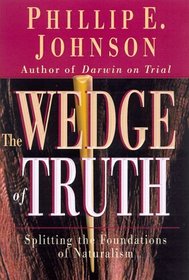Search -
The Wedge of Truth: Splitting the Foundations of Naturalism
The Wedge of Truth Splitting the Foundations of Naturalism
Author:
Science is the supreme authority in our culture. — If there is a dispute, science arbitrates it. If a law is to be passed, science must ratify it. If truth is to be taught, science must approve it. And when science is ignored, stroms of protest are heard in the media, in the university -- even in local coffee shops. — Yet a society ruled by scienc... more »
Author:
Science is the supreme authority in our culture. — If there is a dispute, science arbitrates it. If a law is to be passed, science must ratify it. If truth is to be taught, science must approve it. And when science is ignored, stroms of protest are heard in the media, in the university -- even in local coffee shops. — Yet a society ruled by scienc... more »
ISBN-13: 9780830822676
ISBN-10: 0830822674
Publication Date: 7/2000
Pages: 192
Rating: 1
ISBN-10: 0830822674
Publication Date: 7/2000
Pages: 192
Rating: 1
3.5 stars, based on 1 rating
Publisher: InterVarsity Press
Book Type: Hardcover
Other Versions: Paperback
Members Wishing: 0
Reviews: Amazon | Write a Review
Book Type: Hardcover
Other Versions: Paperback
Members Wishing: 0
Reviews: Amazon | Write a Review
Genres:
- Religion & Spirituality >> Religious Studies >> Science & Religion
- Religion & Spirituality >> Authors, A-Z >> ( J ) >> Johnson, Phillip E.
- Nonfiction >> Social Sciences >> Popular Culture
- Nonfiction >> Social Sciences >> Sociology >> General
- Christian Books & Bibles >> Church History >> General
- Christian Books & Bibles >> Theology >> Apologetics




